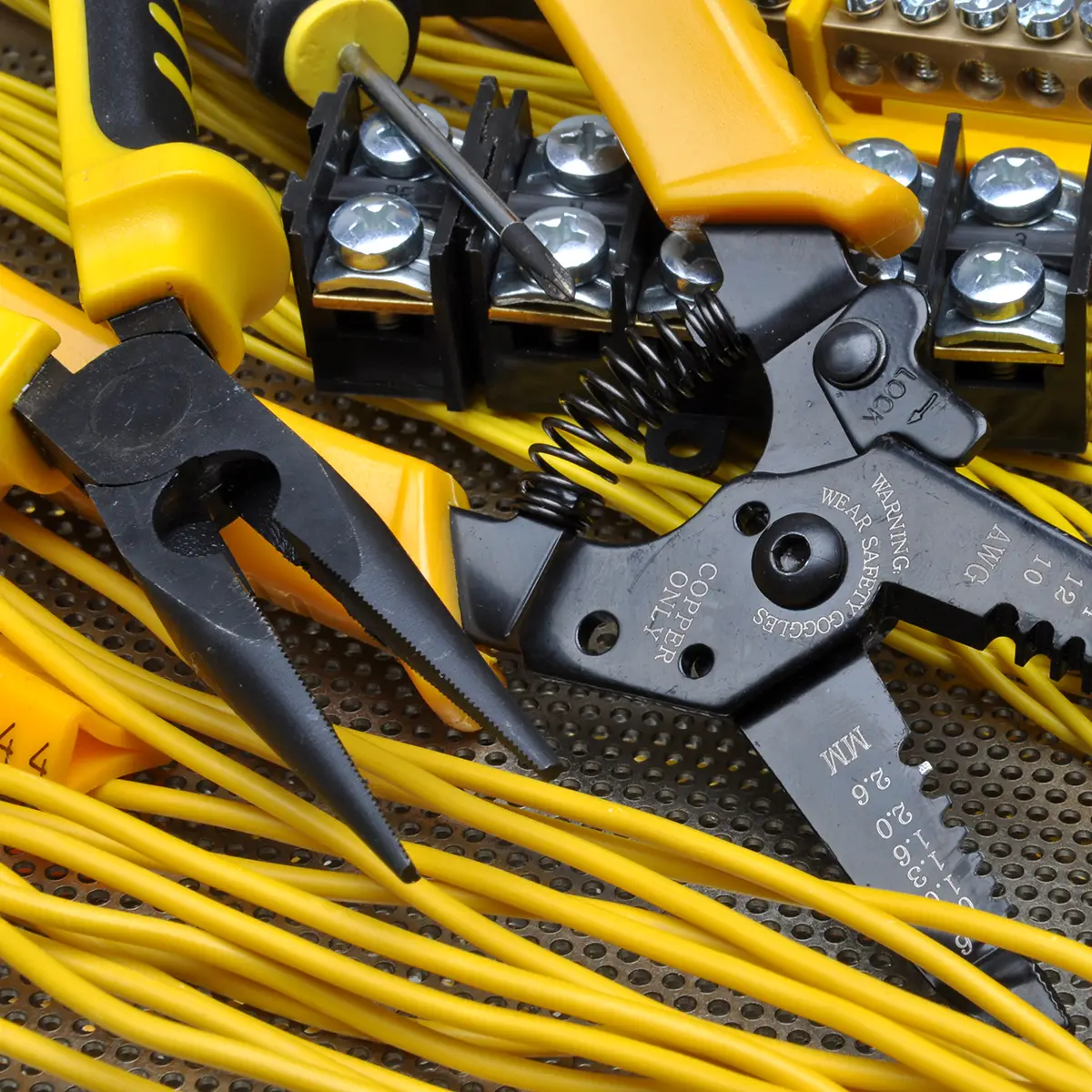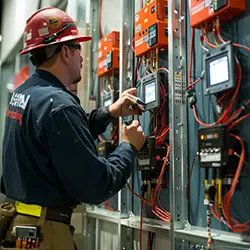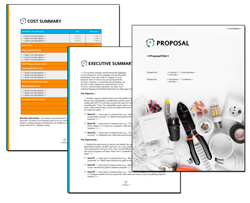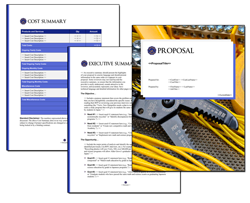
Tips for Writing an Electrical Contractor Proposal
Need help writing an electrical services business proposal? This guide will show you how to define the project scope, estimate costs accurately, and set clear timelines to create a professional proposal.
Key Takeaways
- An electrical contractor proposal should clearly define the scope of work, provide transparent cost estimates, and establish a detailed timeline to build client trust and manage expectations.
- Using Proposal Kit can enhance proposal professionalism through streamlined creation, customization options, and improved presentation, leading to increased client approval rates.
- A successful proposal includes a cover letter that introduces the company addresses client needs, promises follow-up, and showcases expertise through past projects and certifications.
Understanding the Basics of an Electrical Contractor Proposal

An electrical contractor proposal template is more than just a document; it's a tool to showcase your expertise, outline your services, and build trust with potential clients. These electrical proposals typically include several components, such as an interactive quote, options for an online signature, and comprehensive details about the project scope, costs, and timelines.
The main goal is to demonstrate to clients why your company best fits their needs and requirements.
Scope of Work
Defining the scope of work is the backbone of any project proposal. It includes clear objectives, the project's scope, and the deliverables that will guide the execution of the electrical project. This also involves upgrading existing electrical systems and installing new electrical equipment to ensure compliance and efficiency. A thorough project description outlines the methodology to achieve the desired results, ensuring all parties understand the project.
Cost Estimates
Clear cost estimates are crucial for building trust with your clients. This section should include a detailed breakdown of materials and labor costs, ensuring the client understands where their money is going. The total project cost should encompass parts and labor fees, providing a comprehensive financial picture.
Electrical contractors often choose between two main pricing models: time and materials or flat-rate pricing. Each has its own advantages and disadvantages. It is vital to choose the model that aligns with the project's scope and the client's preferences.
Timeline
Including a detailed timeline with milestones in your proposal helps track progress and manage client expectations regarding project completion. A well-defined timeline outlines the proposed start and completion dates and includes critical milestones that help monitor the project's progress.
For example, specifying the proposed start date and the estimated completion date provides clear expectations and helps keep all parties aligned.
The Proposal Kit software helps automate project schedules using its line-item database and automates cost calculations.
Here are some related samples included in every downloadable Proposal Pack
The AI Writer generates a first draft of these templates - customized to your company, client, and project - in just minutes, giving you a head start on editing. Get any Proposal Pack or Proposal Kit Professional, and all of these samples, and the AI Writer are included.
Here are some related downloadable templates
The AI Writer generates a first draft of these templates - customized to your company, client, and project - in just minutes, giving you a head start on editing. Get any Proposal Pack or Proposal Kit Professional, and all of these templates and the AI Writer are included.
Benefits of Using Proposal Kit for Your Electrical Contractor Proposal Template
Proposal Kit offers a collection of templates and a software system that simplifies proposal creation for electrical contractors. These tools can significantly enhance your proposals' effectiveness and professionalism, helping you stand out in the competitive market.
Most electrical contractor proposals are created as responses to RFPs for larger-scale projects, such as government bids and contracts. A comprehensive template and software-based proposal writing system is crucial to managing the process of creating bid responses.
Streamlined Proposal Creation

The Proposal Kit simplifies the proposal writing process with pre-designed templates that save time and effort. For instance, several pre-made layouts are available for electrical contractor proposals to start with more efficiently.
The first step is customizing the templates and software for your business. Proposal Kit includes layouts, design themes, and samples specifically tailored for electrical contractors, ensuring your proposal is professional and relevant.
Customization Options
Customization is crucial for addressing each client's unique needs and preferences. Proposal Kit's templates allow contractors to quickly tailor proposals to meet specific client requirements, enhancing satisfaction and increasing the chances of winning the contract.
Customizable templates help align your proposal with the client's project needs, providing a personalized touch that can significantly influence client perceptions.
Enhanced Professionalism
A professional presentation is essential for electrical contractors to succeed in the market. Proposal Kit helps you create sleek, accurate, and transparent project proposals that enhance the customer experience and leave a lasting impression.
Using a Good/Better/Best format can significantly improve customer impressions of a proposal and help contractors close deals faster. This approach showcases your full potential and provides clients with clear options, catering to different budget levels and preferences.
Creating a Compelling Cover Letter
A compelling cover letter is an essential part of your proposal. It acknowledges the reader's problem and presents the positive aspects of your service. A well-structured cover letter can significantly influence client perceptions and increase the likelihood of closing a deal.
Introducing Your Company

Highlighting your electrical business's unique capabilities is essential in a strong introduction. Showcasing your company's unique attributes distinguishes you from competitors and creates a memorable first impression.
Include details about your company's history, the expertise of your team, and any awards or recognitions you have earned. These elements help potential clients see why your business best fits their needs.
Addressing Client Needs
Understanding the client's specific needs is crucial for a successful proposal. Addressing relevant concerns and challenges demonstrates your ability to meet those needs. This approach builds trust and positions your services as the ideal solution.
Promising Follow-up
Following up with clients is critical to maintaining communication and demonstrating commitment to their needs. Contractors should follow up with the client soon after sending the proposal.
This follow-up shows your dedication and willingness to assist further, reinforcing the positive impression made by your proposal. It ensures continued engagement and helps address any additional questions or concerns the client may have.
Showcasing Your Expertise and Experience
Demonstrating your expertise and experience is crucial for building credibility and trust with potential clients. By highlighting past projects, including client testimonials and showcasing industry certifications, you can demonstrate your ability to deliver high-quality electrical services.
Highlighting Past Projects

Including past projects in your proposal is a powerful way to showcase your expertise.
Detailing the scope of previous projects and outcomes provides potential clients with concrete evidence of your capabilities and reliability.
Including Client Testimonials
Client testimonials are invaluable for building trust and credibility. Testimonials from satisfied clients can reinforce the quality of your services and provide insights into the reliability and satisfaction levels associated with your company.
Incorporating feedback from previous clients can demonstrate the positive impact of your work and help convince potential clients of your professionalism and expertise.
Demonstrating Industry Certifications
Industry certifications are a significant indicator of expertise and professionalism. Special certifications can differentiate your services and enhance your marketability in the electrical contracting field.
If certified, licensed, insured, and bonded, showcase your commitment to compliance and safety standards. Including these certifications in your proposal can significantly enhance client trust and lead to a successful project outcome for an electrical company.
Detailed Project Description and Methodology

A detailed project description and methodology provide a clear project execution roadmap. This section should include an installation schedule, a bill of materials, and post-installation maintenance schedules, ensuring transparency and client confidence.
Installation Process
The installation involves several vital phases, including site assessment, preparation, electrical installation, and final inspection to ensure everything meets project specifications. Defining specific electrical systems or components is crucial when outlining the installation process.
A well-structured installation process influences the efficiency and quality of the electrical wiring project, affecting overall client satisfaction. Detailing each phase provides a clear picture of what the client can expect.
Maintenance and Support
Offering ongoing maintenance services can enhance long-term client satisfaction post-installation. Post-installation support services are essential to address client issues and ensure the system remains functional and efficient.
This support often includes maintenance checks, troubleshooting assistance, and prompt repairs to address issues, ensuring operational reliability.
Compliance and Safety Standards
Compliance with safety standards is crucial in electrical contracting to ensure the safety of both workers and clients. Listing relevant industry certifications and qualifications showcases your expertise and adherence to safety standards.
Recognizing industry certifications can significantly enhance client trust and lead to a successful project outcome. Demonstrating your commitment to safety and compliance builds a strong foundation of trust with your clients.
Terms, Pricing, and Payment Information
Clear terms, pricing, and payment information are essential for a professional proposal. This section helps ensure that both parties mutually understand the financial and contractual obligations, which enhances trust and facilitates smooth project execution.
Detailing the billing details, including customer contact information and payment expectations, is crucial for eliminating misunderstandings and protecting contractor and client interests.
Itemized Pricing

Itemized pricing is essential for maintaining transparency and clarity in your proposal. It ensures that clients can easily understand the project costs and expenses, which helps build trust and mitigates potential disputes down the line. Providing a detailed breakdown of costs, including materials, labor, and other miscellaneous expenses, helps clients see where their money is going and reinforces your professionalism.
Presenting pricing information boosts client confidence in your proposal and aligns expectations between both parties. Establishing a payment schedule and detailing terms and conditions in the proposal is critical for eliminating misunderstandings and protecting contractor and client interests.
Payment Schedule
It is advisable to align payment milestones with project milestones to ensure clarity for both parties. Establishing a payment schedule corresponding to critical project phases can help manage cash flow and client expectations.
A well-structured payment schedule should align with specific project milestones to ensure transparency. This alignment helps contractors and clients manage expectations and cash flow throughout the project, contributing to a smoother execution.
Terms and Conditions
Including clear terms and conditions in a proposal helps protect both parties and avoid misunderstandings. Contractors are encouraged to incorporate a reconsideration period in their proposals to foster clarity and safeguard against potential disputes. This allows both parties to revisit the agreement within 48 hours after signing before any payments are made.
Clarifying contract terms and pricing information improves understanding and enhances trust and project execution. Including these elements in your proposal demonstrates professionalism and a commitment to transparent business practices.
Many times, a contract is signed after the proposal is accepted. A work order or short-form terms page may be included in the proposal for small job projects. Consult your attorney for advice and to review your contracts and agreements before using them in business.
How to Present Your Proposal to Clients
An effective proposal presentation can significantly enhance your chances of client acceptance. Engaging the client during a proposal presentation increases the likelihood of approval, demonstrating your professionalism and ensuring continued engagement.
Summarizing your proposal's key points can reinforce the benefits and help solidify the client's decision.
Scheduling a Meeting

Organizing a face-to-face or virtual meeting allows for a more engaging discussion about the proposal. It's beneficial to arrange an in-person or online meeting to discuss the proposal directly with the client, showing respect for their time and allowing for focused discussion.
Scheduling a dedicated time for a proposal presentation ensures the client is fully attentive and ready to engage in a productive dialogue. This approach can significantly enhance the overall effectiveness of your proposal presentation.
Explaining Key Sections
When presenting, focus on walking the client through essential sections of the proposal, emphasizing the most critical points. Outlining the agenda at the beginning of the meeting provides a roadmap for the client, ensuring they know what to expect during the discussion.
This structured approach helps keep the presentation on track and ensures that all critical aspects of the proposal are thoroughly covered. Explaining each section helps the client understand your approach and reasoning, significantly enhancing their confidence in your proposal.
Addressing Questions and Concerns
Addressing the client's specific needs and concerns in your proposal is crucial to building rapport and trust. Scheduling a face-to-face or virtual meeting to present the proposal allows for real-time questions and clarifications, significantly enhancing the client's understanding and confidence in your proposal.
Address questions and concerns effectively, positioning you as a considerate, professional contractor who values the client's perspective. This approach helps clarify doubts and reinforces your dedication and willingness to assist further.
Summary
Creating a winning electrical contractor proposal involves understanding the basics, using advanced tools like Proposal Kit, and presenting your expertise professionally. Following this guide's tips and strategies, you can create compelling proposals that win contracts and build lasting client relationships. Embrace these practices and watch your electrical business grow.
 Proposal Kit Professional provides the most content, including legal contracts and a free design theme pack. Plus, advanced software features include custom branding and customizable quoting databases.
Proposal Kit Professional provides the most content, including legal contracts and a free design theme pack. Plus, advanced software features include custom branding and customizable quoting databases. Proposal Pack for Any Business covers this type of proposal and includes samples. There are also some commonly used specialty design themes available:
Proposal Pack for Any Business covers this type of proposal and includes samples. There are also some commonly used specialty design themes available:Photo Design Proposal Packs
Line Art Design Proposal Packs
Frequently Asked Questions
What are the critical components of an electrical contractor proposal?
An electrical contractor proposal should contain a detailed scope of work, accurate cost estimates, timelines, and a cover letter to engage the client. These elements collectively enhance clarity and professionalism in your proposal.
How can Proposal Kit help in creating electrical contractor proposals?
Proposal Kit can significantly enhance your electrical contractor proposals by providing ready-made templates and customizable tools that improve efficiency and professionalism. This ensures your proposals stand out and meet client expectations.
Why is it essential to include client testimonials in a proposal?
Including client testimonials in a proposal is crucial. They enhance trust and credibility by demonstrating the satisfaction and reliability of your services. This evidence of past success can significantly influence a potential client's decision-making process.
What role does a follow-up play in the proposal process?
A follow-up plays an essential role in the proposal process. It demonstrates your commitment, addresses client concerns, and maintains engagement, significantly increasing the likelihood of securing the contract.
How can industry certifications enhance the effectiveness of a proposal?
Industry certifications enhance the effectiveness of a proposal by showcasing your expertise and compliance with safety standards, which builds client trust and sets you apart from competitors.



 Cart
Cart
 Are you just looking for a template, sample, or software for your electrical work proposals? Click these links to skip down the page and get right to it.
Are you just looking for a template, sample, or software for your electrical work proposals? Click these links to skip down the page and get right to it.







 Facebook
Facebook YouTube
YouTube Bluesky
Bluesky Search Site
Search Site